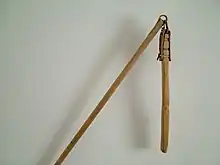swingle
See also: Swingle
English

Swingle (or scutch) (sense 1)

Handstock (left) and swingle (right) (sense 2)
Etymology 1
The noun is from Middle English swingel, from Old English swingel, swingelle (“whip, scourge”), equivalent to swing + -le. Related to Middle Dutch swingel, swengel, Dutch zwingel, zwengel. Doublet of swingel. The verb is from Middle English swingelen, from the noun. Related to Middle Dutch swingelen, swengelen.
Pronunciation
- IPA(key): /ˈswɪŋ(ɡ)əl/, /ˈswɪnd͡ʒəl/
- Rhymes: -ɪŋəl, -ɪŋɡəl, -ɪnd͡ʒəl
Noun
swingle (plural swingles)
- (textiles) An implement used to separate the fibres of flax by beating them; a scutch.
- The swinging part of a flail, especially that which is used on the grain in threshing; the swipple.
- 1984 April 19, Joseph Needham, Francesca Bray, Science and Civilisation in China, Part 2, Agriculture, Cambridge University Press, →ISBN, page 357:
- The pole of the Chinese flail is roughly 90 cm. long, the swingle about 30 cm. in length, joined to the pole by a wooden axle projecting at right-angles from the top of the swingle and passing through a loop at the top of the pole […]
- 2004, Elizabeth Hafkin Pleck, Domestic Tyranny: The Making of American Social Policy Against Family Violence from Colonial Times to the Present, University of Illinois Press, →ISBN, page 27:
- (A flail swingle was a large wooden handle attached to a freeswinging stick, which was used in threshing grain.)
- 2013 10, Michael D. J. Bintley, Michael G. Shapland, Trees and Timber in the Anglo-Saxon World, Oxford University Press, →ISBN, page 137:
- Once cut into the correct size and shape, the handle of the flail, dumb in bendum 'unspeaking in bonds' (6b), is attached to the swingle or swipple, the swinging part of the flail, with a cord, rope, or chain tied through the hole or […]
Derived terms
Verb
swingle (third-person singular simple present swingles, present participle swingling, simple past and past participle swingled)
- (transitive) To beat or flog, especially for extracting the fibres from flax stalks; to scutch.
- 1623, Gervase Markham, Country Contentments, or The approued Booke called the English Hous-wife, page 168:
- Now after you have swingled your Hempe and Flaxe ouer once, you shall take and shake up the refuse stuffe, which you beate from the same seuerally, and not only it, but the tops and knots, and halfe brak't buns which fall from the brake also, and drying them againe cause them to bee very well thresht with flayles, and then mixing them with th refuse which fell from the swingle tree, dresse them all well with threshing and shaking, till the buns be cleane driuen out of them;
- 1764, Duhamel du Monceau, The Elements of Agriculture - Volume 2, page 174:
- The instruments necessary to swingle flax are, a tressel, and a swingle.
- 1858, John Harland, editor, The House and Farm Accounts of the Shuttleworths of Gawthorpe Hall, in the County of Lancaster:
- The first operation in dressing flax is to swingle or beat it, in order to detach it from the harle or skimps.
- 1867, Horatius Flaccus, The Vision of Judgment: Or The South Church:
- Just what he said, they neither of them knew. For hearing is a sense made blunt by fright; But then their ears were flushed, and burned and tingled, As if they'd been by some sharp weapon swingled.
- 1976, Andriĭ Vasylʹovych Holovko, The Weeds: A Novel, page 28:
- She returned to her swingling and added reflectively : " That's what made me leave in the first place, to keep out of harm's way. […] ".
- 2021, Helen D. Irvin, Women in Kentucky:
- Later she “spread, rotted, broke, swingled, and hacked” the weeds, twisting together several strands of fiber, and she used these strands to weave a frail fabric on a home-built loom.
Pronunciation
- IPA(key): /ˈswɪŋ(ɡ)əl/
- Rhymes: -ɪŋəl, -ɪŋɡəl
Verb
swingle (third-person singular simple present swingles, present participle swingling, simple past and past participle swingled)
Further reading
- Joseph Wright, editor (1905), “SWINGLE”, in The English Dialect Dictionary: […], volumes V (R–S), London: Henry Frowde, […], publisher to the English Dialect Society, […]; New York, N.Y.: G. P. Putnam’s Sons, →OCLC.
This article is issued from Wiktionary. The text is licensed under Creative Commons - Attribution - Sharealike. Additional terms may apply for the media files.